|
|
|
Sort Order |
|
|
|
Items / Page
|
|
|
|
|
|
|
| Srl | Item |
| 1 |
ID:
101830
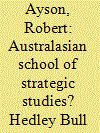

|
|
|
|
|
| Publication |
2011.
|
| Summary/Abstract |
To the extent that there is a distinctively Australasian school of strategic studies it is to be found in the work of Hedley Bull, a scholar who is more widely noted for his work as an international relations theorist. Bull's lesser known but influential contributions to strategic studies dealt with the management of nuclear weapons in international strategic relationships and the management of great power relations in the Asia-Pacific region. His work in these areas, while less well known than some of his other writings, deserves contemporary attention as strategic change in Asia increasingly shapes the international strategic picture, thereby creating the opportunity for Australasian strategic analysts to influence the global debate.
|
|
|
|
|
|
|
|
|
|
|
|
|
|
|
|
| 2 |
ID:
101829
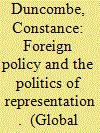

|
|
|
|
|
| Publication |
2011.
|
| Summary/Abstract |
The patterns of representation that position the West as the dominant enlightened Self to the non-West's subordinate Other are evident in Hollywood filmmaking. Films such as A Mighty Heart, The Kingdom and The Siege continue to maintain the Hegelian Master/Slave dialectic of West/non-West, which becomes part of the narrative of the West's identity construction. In delving into this supposed relationship between West and non-West, it appears as though few scholars have considered how the processes of representation feed into this essentialised dialectic. In delving into the area of representation, a space for understanding emerges in relation to determining whether or how much being represented in certain ways affects or acts to manipulate the behaviour and choices of the Other, especially in terms of foreign policy conduct. This article examines representational dynamics in terms of the position of the Other as Self, in order to offer an authoritative conception of how schemas of representation influence the direction of foreign policy.
|
|
|
|
|
|
|
|
|
|
|
|
|
|
|
|
| 3 |
ID:
101828
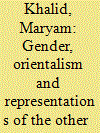

|
|
|
|
|
| Publication |
2011.
|
| Summary/Abstract |
After 9/11, images of the Middle Eastern or Muslim 'Other' have been highly visible in the Western world. Although published 30 years ago, Edward Said's Orientalism provides a useful critical lens through which to examine how these images function in War on Terror discourses. Feminist IR scholars have also highlighted the role gendered representations play in War on Terror discourse, and 'orientalism' as a tool of critical analysis must account for this. Using a concept of 'gendered orientalism' and applying it to three particularly prominent images from the War on Terror, I illustrate how gendered and orientalist logics in official and unofficial War on Terror discourses construct masculinities and femininities according to race, manipulating and deploying representations of the 'Other' to justify military involvement in Afghanistan and Iraq.
|
|
|
|
|
|
|
|
|
|
|
|
|
|
|
|
| 4 |
ID:
101831
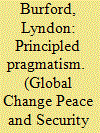

|
|
|
|
|
| Publication |
2011.
|
| Summary/Abstract |
From 1995 to 2000, transnationally active, New Zealand non-governmental organisations and individuals influenced New Zealand nuclear disarmament policy in significant and sometimes pivotal ways. During this period, New Zealand emerged as a global norm leader, experiencing the zenith of its influence on international nuclear disarmament diplomacy. As such, the NGO activity examined here also had significant downstream effects on international political, legal and normative developments. This article broadens the body of empirical data on the work of transnational disarmament advocacy. Its findings reinforce and deepen constructivist understandings about the importance of non-traditional actors and ideational factors such as norms, identity, and ethics in the conduct of international relations.
|
|
|
|
|
|
|
|
|
|
|
|
|
|
|
|
| 5 |
ID:
101833
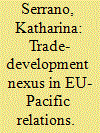

|
|
|
|
|
| Publication |
2011.
|
| Summary/Abstract |
For almost 40 years, relations between the European Union and African, Caribbean and Pacific (ACP) countries centred on trade and development policy. The partnership survived various challenges and evolved into an institutionalised model for North-South relations. In reaction to internal and external forces of change, in the Cotonou Agreement (2000) the EU introduced to its relations with the developing world a new trade-development paradigm to be implemented via Economic Partnership Agreements. The latter are intended to be innovative foreign policy instruments, functioning as development tools and trade liberalisation mechanisms. Against the background of current internal restructuring of EU foreign policy and an increasingly politicised development agenda, this article undertakes an enquiry into the nature of the trade-development nexus in EU-Pacific Island countries (PICs) relations. The analysis is based on a theoretical framework which employs assumptions and findings related to IR theory, referring in particular to realism and dependency theory. A critical examination of EU policies shaping the trade-development nexus reveals that it is a rather flexible foreign policy tool, equipped with an auto-adjustment mechanism to ensure the balance of EU trade and development objectives. From PICs' perspective, its predictability and therefore developmental value, may, however, be diminished.
|
|
|
|
|
|
|
|
|
|
|
|
|
|
|
|
| 6 |
ID:
101832


|
|
|
|
|
| Publication |
2011.
|
| Summary/Abstract |
The creation of formal regional cooperation in Southeast Asia is generally attributed to initiatives that came from countries in the region. In particular, the creation of the Association of Southeast Asian Nations (ASEAN) was a direct result of the Malaysian-Indonesian talks that ended Confrontation. Indeed, at the time many Asian leaders denied that ASEAN was the result of an outside idea or action. However, this position ignores the importance of Western financial aid in the establishment and subsequent success of ASEAN, as well as the various policy positions Western countries had taken since the end of the Second World War. This article argues that Southeast Asian regional cooperation was influenced by both Western and Asian policy and its development reflected the economic and political transformation of the Southeast Asian landscape that was taking shape at the time.
|
|
|
|
|
|
|
|
|
|
|
|
|
|
|
|
|
|
|
|
|